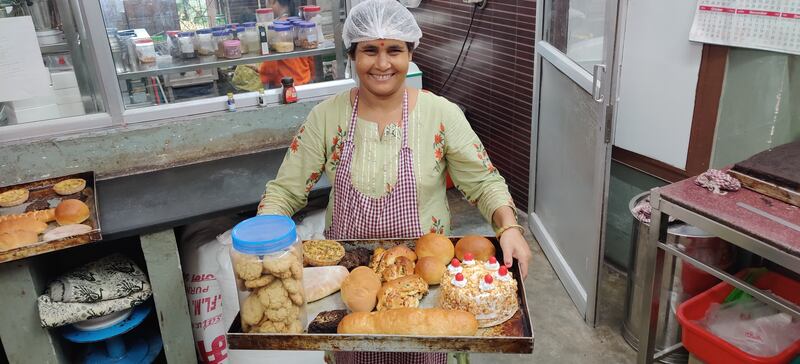As a group of customers at Sheroes Hangout in Lucknow, Uttar Pradesh, wait for their order of sandwiches and chai, the cafe’s PR and outreach manager Anshu Rajput sits down to chat with them.
“Do you know anything about acid attacks in our country?” Rajput asks.
She tells them that India has the highest number of acid attacks every year, and it’s believed there could be as many as 1,000 cases annually, but 60 per cent are never reported.
These kinds of attacks, she continues in Hindi, have catastrophic effects on the victims and can completely eradicate their identity, not to mention leave them with disabilities.
Rajput also explains to her avid listeners what they should do if they come across a victim. While calling an ambulance and the police is great, she says, “the first thing you need to do is pour a lot of water on a victim’s burns to wash the acid away”.
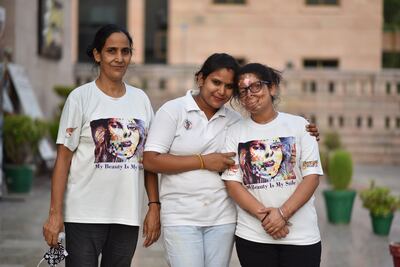
You might wonder why she’s talking about such a heavy subject with her customers, but that’s Sheroes Hangout’s whole reason for being. The cafe, which was launched by the Chhanv Foundation in 2014 near the Taj Mahal in Agra, is run by 15 acid attack survivors, Rajput included, who have struggled to find societal acceptance because of their disfigured faces and bodies.
“We wanted to find a solution for them not only to earn a livelihood, but also to regain their confidence to work along with others,” explains co-founder Ashish Shukla, 30, who is also the director of Chhanv.
It’s one of several initiatives by the organisation to rehabilitate acid attack survivors, including awareness-raising campaigns and events. At Sheroes Hangout, where a mix of Indian and Chinese cuisine is served, “easy interactions with customers who come for good food and are receptive to listening are more impactful than any campaign”, says Shukla.
Even if the customers don’t interact with the staff, they can’t miss the profiles of the women who work at the cafe adorning the walls.
Rajput, 20, first joined the cafe as a waitress in 2016, and worked her way up the ladder. In her roles, she has learnt to speak comfortably about her experience, whereas previously she’d feared stepping out of her own home.
“Like everyone else, we also want a normal, peaceful life and to earn a living,” she tells patrons. “Thank you for supporting our cause.”
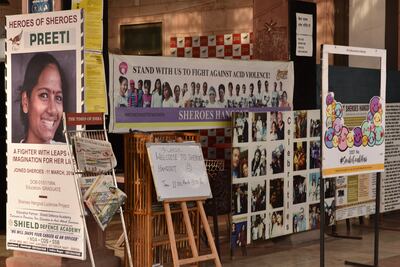
Sheroes Hangout is among a growing breed of cafes in India that give a platform to marginalised communities often excluded from society and the workforce. These businesses, which are serving a slice of social justice alongside their fare, aim to offer people a way to find their feet, earn a living and promote inclusion.
Another such place is Mitti Cafe, located in the state of Karnataka in the south of India. All 16 of its outposts are based within corporations, hospitals and as independent restaurants, offering jobs to 116 employees who are amputees, wheelchair users, blind, deaf or have intellectual disabilities. They work as servers, accountants, kitchen helpers or inventory managers.
Keerti Kale, 25, manager of the first Mitti Cafe, which is located in Hubli, is a paraplegic. Before she got her job, she tells The National, her friends would ask questions such as, “Will you ever be able to do anything in life independently?”
Kale had dropped out of school early because of her low self-esteem and a lack of spoken English and computer skills. She’d never thought of applying for a job, instead helping her mother run a tea kiosk on a table outside their home for years.
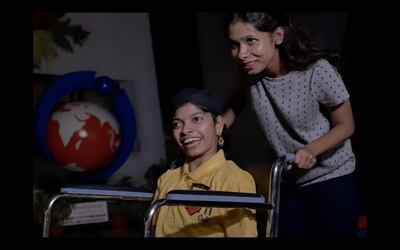
Then Alina Alam, the founder of Mitti Cafe, bought Kale a wheelchair, allowing her to move around the cafe and take orders. “When I started mingling with the customers, I realised that I’m also a human being, just like them,” says Kale.
It’s hasn’t only affected her self-confidence, but also her physical abilities. “Before joining the cafe, I couldn’t hold anything with my right hand,” Kale, 25, says. “Alina constantly encouraged me to try doing things with my right hand, saying I will succeed some day.” Today, her right hand has a firm grip and she can take a full glass of water to her mouth.
“We started Mitti Cafe in 2017 to give people with disabilities a livelihood and dignity,” Alam, 28, explains. She believes in letting her employees make mistakes and learn from them. Kitchen equipment and the cafe spaces have been made accessible based on the employees’ and customers’ needs. Most items on the menu, which includes home-style Indian and fusion food, are also simple to rustle up.
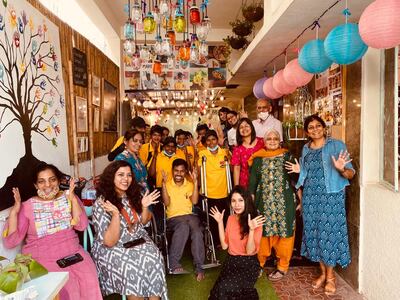
Elsewhere, in Kolkata, Iswar Sankalpa, a charity that works with rescued homeless people diagnosed with schizophrenia, runs Crust & Core, a cafe and bakery for women. “The idea behind opening the cafe in 2018 was to challenge the belief that these people can’t take care of themselves or do anything independently and are a burden on the society,” says cafe co-ordinator Garima Chandak, 30. “We wanted to show the world that if we provide them with opportunities, skills and a bit of motivation they can earn a living.”
So far, 32 women have been trained, and they were given the space to learn at their own pace.
Kamala Darji, a resident of Digboi, Assam, left her home three years ago because she was being treated as a burden by her family. She came to Kolkata and was referred to Iswar Sankalpa, where she was given free treatment and trained as a baker.
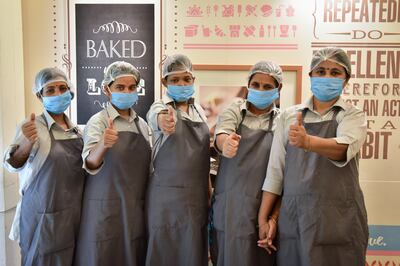
“I work together with seven other girls in the kitchen and enjoy baking brownies, pizza bases, lemon tarts, masala and garlic bread every day,” she says. Darji, 45, doesn’t remember her address and phone number, but hopes to be reintegrated with her family once Covid-19 subsides and the charity can help her find her home. Meanwhile, she is saving the stipend earned from the cafe to open a shop in her village to sell her baked goods.
The pandemic has unsurprisingly had a negative impact on these cafes. They have not been profitable and Sheroes Hangout even had to shut its Agra venue temporarily. All three brands have continued operations, however, via online delivery and by reducing customer interaction.
“Even though our customers come back for our healthy cuisine,” says Alam, “the opportunity to make a difference to someone’s life has always been a pull factor.”
